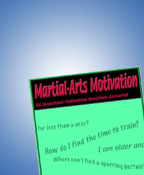It's possible to improve your martial arts technique without physically practicing. It's true, and it's not a bunch of mumbo-jumbo or "hooey." Here's how this technique evolved....
My martial arts class breaks for summer vacation. Then we start up in the fall. Usually, when we come back in the fall my students are pretty rusty --their sloppiness from lack of practice shows.
This particular September day, I started class as usual, but I immediately noticed that one of my students wasn't as rusty as all the rest. In fact, some of his techniques were crisp and clean. I knew that he had taken lessons from someone over the summer.
When I asked him about it, he said that he hadn't. As I asked him more and more questions about his noticeable improvement, it became apparent what had happened. He hadn't physically practiced, but he had thought about our classes a lot. He had done all of his practice in his mind. Hmmm.
I went back to my old psychology books from college, and sure enough, there was a ton of evidence to support this phenomenon. The most famous study involved three groups of people practicing free throws from the foul line in basketball.
The first group didn't practice and didn't think about basketball -- they were the control group. The second group practiced shooting free throws (making baskets) for twenty minutes a day. The last group went to the basketball court without basketballs. They visualized making baskets for twenty minutes a day. What happened?
You guessed it. The control group didn't improve. And while the practicing group improved the most, the group that just thought about making baskets weren't far behind. They improved a lot too, just not as much as the physical group.
So, I went back to my martial arts students and explained what I had found. They were eager to try. After about a month, I noticed that almost all had stopped practicing in their heads, and those who hadn't weren't improving. What was a teacher to do?
I started giving them instructions (typical teacher). But I didn't give them all the same advice. They were my guinea pigs. Each student got a different idea to try out.
I immediately noticed a difference. They were improving. Yippeee. But was anyone improving more than the others? The answer was definitely yes.
Of course, over the years, I have tried this technique on several students and they all seem to improve. So, what's the technique already?
Mentally pick targets throughout the day. Do this while you are talking to a friend or relative, while going through the checkout line at the store, or even while talking to your boss (actually hitting your boss is NOT a good thing).
While talking to someone, or better yet, while pretending to listen, look at your "opponent's" hand and body position. Which foot is forward? How are the hands postioned? Are there any openings?
Now go through the process of actually picking your targets:
1. Could you reach an opening before the body changed positions, thus closing the line?
2. Are you fast enough to get through the opening before your opponent blocks or checks? (Careful! Some systems don't block.)
3. If the hand were to move closing off the opening, what might you do in response?
4. How would you react if you were suddenly attacked by this person? Would the attack create new openings for you to "explore" new targets?
Also, think about multiple attackers. Actually, it's sometimes better if you are talking in a group. I find it hard to mentally practice and carry on a conversation at the same time. (I have been accused of spacing off, while I was actually intensely practicing...in my mind).
If you practice while you're in a group of people, you can stay silent a lot longer without anyone noticing. After all, you don't want to be rude. It's bad enough that you'll be missing some of the conversation.
Also, don't practice while operating heavy machinery, driving or performing any sort of task that requires your undivided attention. I also don't want you to get reprimanded for "spacing" during an important meeting (or class discussion).
Let me know what you think of this tactic. Also, if you want some specific advice on how to apply this technique to tv and movie watching, just e-mail me.

Actual questions from my readers all on motivation -- finding practice partners, the time to train, the will to train, the motivation to keep going.
One tip from these pages could make all the difference in your martial-arts training and improvement. Read more about 58 Martial-Arts Motivation Questions ...FREE
Martial Arts
Weekly ezine
Mastery